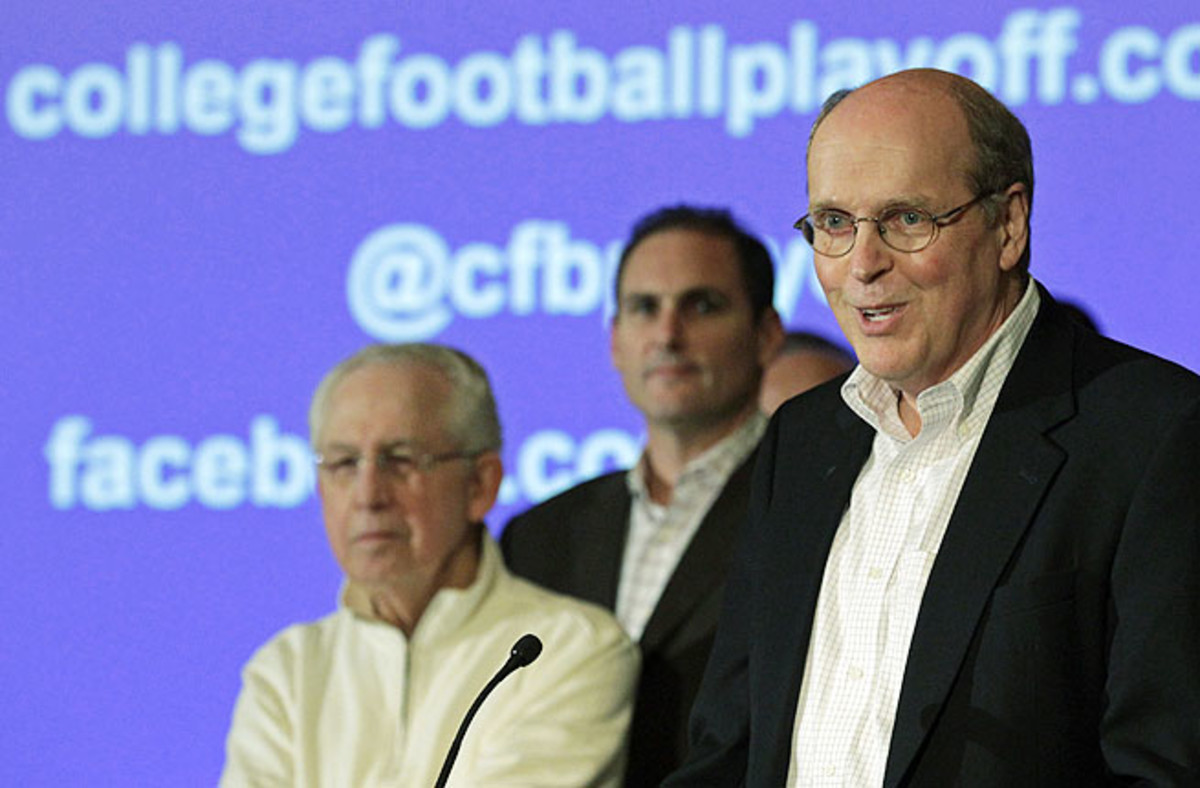College Football Playoff to replace BCS


The Bowl Championship Series will be replaced by the College Football Playoff.
The BCS conference commissioners announced the name of the new postseason system that starts in 2014 on Tuesday, the first of three days of meetings at a resort hotel in the Rose Bowl's backyard.
They also will choose the remaining three sites for the six-bowl semifinal rotation in the new system and the site of the first championship game to be held Jan. 12, 2015, this week.
The website www.collegefootballplayoff.com is already up and running and allowing fans to vote on a new logo. It also has a Twitter handle: (at)cfbplayoff.
"It's really simple. It gets right to the point," BCS executive director Bill Hancock, who will hold the same position in the playoff system, said at a short news conference with the 10 commissioners of the FCS conferences.
"Nothing cute. Nothing fancy. We decided it would be best to call it what it is."
Premiere Sports Management in Overland Park, Kan., was hired to help come up with a name and brand the new system. A committee of commissioners handled the naming of the new system. Hancock said they ran through "in the neighborhood of three dozen" names.
Pac-12 Commissioner Larry Scott said, "We're clearly trying to make a clear break from the BCS."
Before the news was reported, Big Ten Commissioner Jim Delany said he'd be happy with whatever was selected.
"I'm am not good with names - obviously," Delany said during a break in the meetings, referring to the Big Ten's division names, Legends and Leaders, that produced so much negative feedback the conference has already decided to change them.
The new postseason format will create two national semifinals to be played New Year's Eve or New Year's Day, with the winners advancing. The six bowls in the playoff rotation will host marquee, BCS-type games on New Year's Eve or New Year's Day during the seasons they do not host a semifinal.
"I don't think you can ever go too wrong calling something what it is," Scott said. "Things that make sense tend to stand the test of time."
Three semifinal spots have already been decided: the Rose, Orange and Sugar bowls.
Four other bowls have bid for the final three spots. The clear front-runners are the Cotton, Chick-fil-A and Fiesta. The Holiday Bowl in San Diego also put in a bid, but even its organizers have acknowledged they are a long shot at best to land the game.
Those decisions will be announced Wednesday.
The coaches on the Big 12's spring teleconference were already talking about the Cotton Bowl having a spot in the rotation as if it was a done deal.
"I think it's really exciting for this region, for everybody, and I think all of the schools in this region, to have Dallas as one of those sites is great for everybody in this region, and exciting for everybody," Oklahoma coach Bob Stoops said. "Obviously, everybody knows what a great and quality, what an awesome stadium it is, then the location for us is an advantage, or should be."
The first semifinals will be played at the Rose and Sugar bowls.
The site of the first national championship game in the new system will also be determined at these meetings and the finalists are Cowboys Stadium in Arlington, Texas, the billion dollar home of the NFL team and the Cotton Bowl, and Raymond James Stadium in Tampa, Fla., home of the Buccaneers.
Arlington is the favorite to land that first championship game, but the competition from Tampa has been serious.
"I'm glad it has," Big 12 Commissioner Bob Bowlsby said Tuesday. "I think it will give us a better outcome."
Also on the agenda this week for the commissioners will be the composition of the selection committee that will set the field for the playoff. They have said they would like the committee to be similar to the one that picks the teams for the NCAA basketball tournament, made up of conference commissioners and athletic directors.
Bowlsby said he expected both current and former administrators to have a spot on the committee.
"The hardest thing is making sure we're arming whoever is on the committee with the tools that it takes to differentiate among closely proximal teams," Bowlsby said. "You have to have some metrics available to differentiate between three, four, five, six and seven."
"You can't just say we like blue uniforms and not gold uniforms. You've got to arm the committee with the tools that it takes to do their job."
